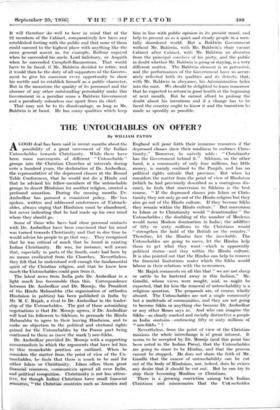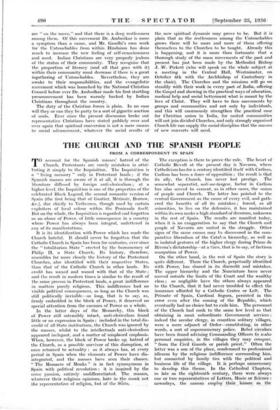THE UNTOUCHABLES ON OFFER ?
By WILLIAM PATON AGOOD dear has been said in recent months about the possibility of a great imovement of the Indian Untouchables towards Christianity.' While there have been mass movements of different ' " Untouchable " groups into the-'Christian Churches at intervals during over a -hundred years,- the declaration of Dr. Ambedkar, the representative of the depressed classes at the Round Table Conferences, that he would not die 'a' Hindu and that he advised his fellow-members. of "the 'untouchable groups to desert Hinduism for another religion, created a profound sensation. During the ensuing months Dr. Ambedkar has pursued a consistent policy. He has spoken; written and addressed conferences of -Untouch- ables, always urging that Hinduism must be abandoned, but never indicating that he had made Up his own mind where:they should go., • Some of those 'Who have' had close personal contacts with Dr. Ambedkai have' been convinced that his mind was turned towards Christianity-and that in doe time he would advise his people to go that way. They recognised that he' was. critical of much that he found in existing Indian Christianity. He - was, for instance,' well aware that, 'especially in 'parts of the South, caste had been by no means *eradicated- from the -Churches. Nevertheless, they felt that he understood well enough the fundamental spirit of the Christian religion, and - that "he knew how Much the -,Untouehables -could gain froin it.
The latest neWS froin India puts Dr. Azribedkar in a light much - less- faVOUrable than this. 'Correspondence between Dr. Ambedkar and Di. Moonje, the President of the Hindu Mahasahha (the organisation of orthodox Hinduisnri in polities) has been published in India by Mr. M. C. Rajah, a rival to Dr. Ambedkar in the leader- ship of the Untouchables. The gist of-these astonishing negotiations IS that Dr. Moonje agrees; if Dr. Ambedkar Wilt lead his followerS to-Sikhism, to persuade the Hindu Mahasabha 'to -agree to- their leaving Hinduism, and to make rio- objeetion • to the political and electoral rights gained for the Untouchables by the Poinni pact being continued to them as (save 'the Mark 0 nee-Sikhs.
'Dr. Ambedkar provided Dr. Moonje-with a supporting themorandinit in which the arguinents that have led hid'. to -this reniarkable position are outlined. When he COnsideis the Matter from the point of view of the Un- touchables, he• finds that there is much to be' said for either Islam 'or Chriitiaiiity. Islam offers' them great financial resources, ''corrimunitieS spread all over India, and political recognition. - 'Christianity is not less .attrae- tive, for thOugh Iridiari Christians have small financial resources; Chriatian cOuntries•SuCh as AMeriCa and England will pour birth their immense resources if the depressed classes show their readiness 'to embraee Chris- tianity." MoreOver, he naively adds " Christianity has the Government behind it." Sikhism, on the other hand, is a community of only folio millions, has little money, is mainly confined to the Panjab, and has no political rights outside that province. • But when ha considers the matter from the point of view of Hinduism (which 'he had previously described as a contagious dis- ease), he finds that conversion to Sikhism is the best course. " If the depressed classes join Islam or Chris- tianity they not only go out of the Hindu religion-but they also go but of the Hindu culture. If they become Sikhs they remain within the Hindu culture." But conversion to Islam 'or to Christianity would " denationalise" the Untouchables ; the doubling of the- 'number' of Moslems would mean Mosleni domination in India ; the' addition of 'fifty or 'sixty millions to the Christians would -"'strengthen the hold of the British on the country." Therefore, let the Hindus face the inevitable. The Untouchables are going to move, let the Hindus help them to get what 'they want—which is apparently political status—and stay within the Hindu culture. It is also pointed out that the Hindus can help to remove the financial limitations under which the Sikhs would labour in their relations with the newcomers.
Mi.` Rajah comments on all this that " we are not sheep Or cattle to be bartered away in this fashion." Mr. 'Gandhi, whose views were sought, said, as might be expected, that for him the removal of untouchability is a religious question. The proposals are, of course, wholly absurd. The Untouchables are not a single community but a multitude of communities, and they are not going to become Sikhs Or anything else because Dr. Ambedkar or any other Moses says so. And Who can imagine the Sikhi—as clearly marked and racially distinctive a people as India contains—embracing fifty or sixty millions of -"rieo-Sikhs " ? • NeVertheless, from the point of view of the Christian Missions the whole interchange is of 'great interest. It seems to be accepted by 'Dr. Moonje (and this point has been noted in the Indian Press), that the Uritouchables are going to cease to be Hindus, and that the process cannot be stopped. He does not share the faith Of Mr. Gandhi that the cancer • of untoucluibility can be Cut out of the body Of Hinduism, nor, indeed, does he evince any desire that it shOuld be cut out But he can try to stop their ..becoming Musfrins or Christians. 'There 'is a 'growing conviction among both Indian thriatians 'and 'missionaries that the UntiiehableS are " on the 'move,' and that there is a deep restlessness among them. Of this movement Dr. Ambedkar is more a symptom than a cause, and Mr. Gandhi's own work for the Untouchables from within Hinduism his done much to increase the new feeling of self-consciousness and need. Indian Christians are very properly jealous of the status of their community. They recognise that the proportion of literacy (and all that goes with it) within their community must decrease if there is a great ingatheying of Untouchables. Nevertheless, they are awake to their responsibilities, and the evangelistic movement which was launched by the National Christian Council before ever Dr. Ambedkar made his first startling pronouncement has been warmly backed by Indian Christians throughout the country.
The duty of the Christian forces is plain. In no case will they or can they be party to a sort of gigantic auction of souls. Ever since the present discussion broke out representative Christians have stated publicly over and over again that spiritual conversion is not a mere means to social advancement, whatever the social results of the new spiritual dynamic may prove to be. But it is plain that as the restlessness among the Untouchables grows there will be more and more of them offering. themselves to the Churches to be taught. Already this is happening, and it is more than fortunate that a thorough study of the mass movements of the past and present has just been made by the Methodist Bishop J. %W...-Pickett {who will speak on the whole subject at a ,meeting in the Central Hall, Westminster, on October 8th with the Archbishop of Canterbury in the chiir). The Churches and the missions will go on steadily with their work in every part of India, offering the Gospel and showing in the practical ways of education, medical-help and social betterment what is meant by the love of Christ. They will have to face movements by groups and communities and not only by individuals, and this will enormously strengthen the practical ease for Christian union in India, for united con-nnunities will not join divided Churches, and only strongly organised Church life can supply the social discipline that the masses of new converts will need.



















































 Previous page
Previous page